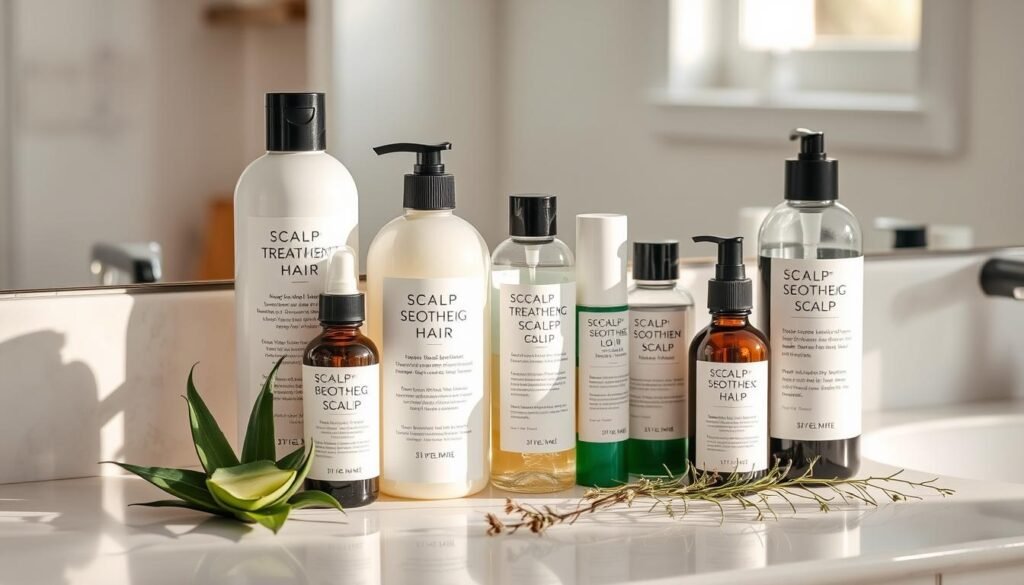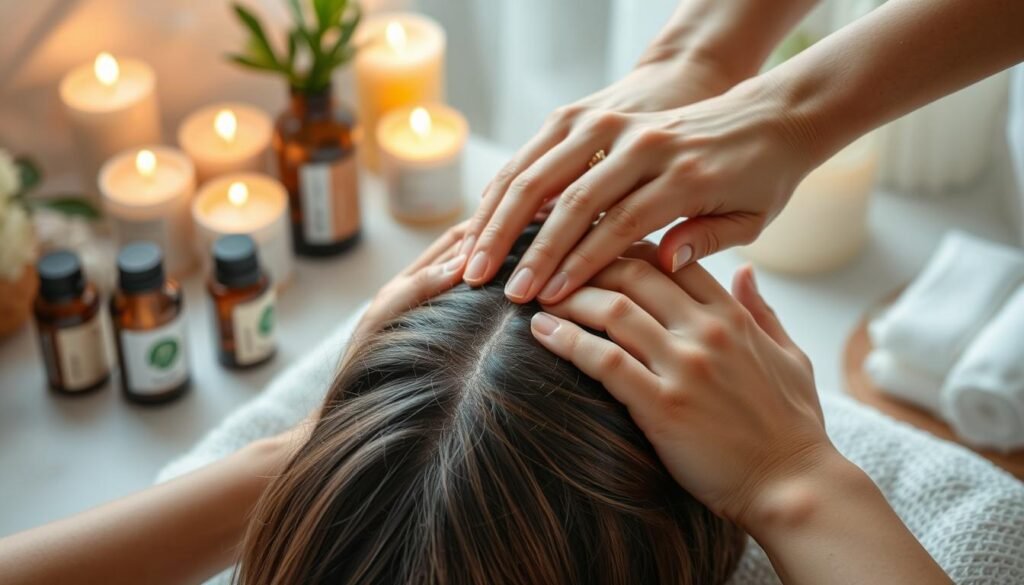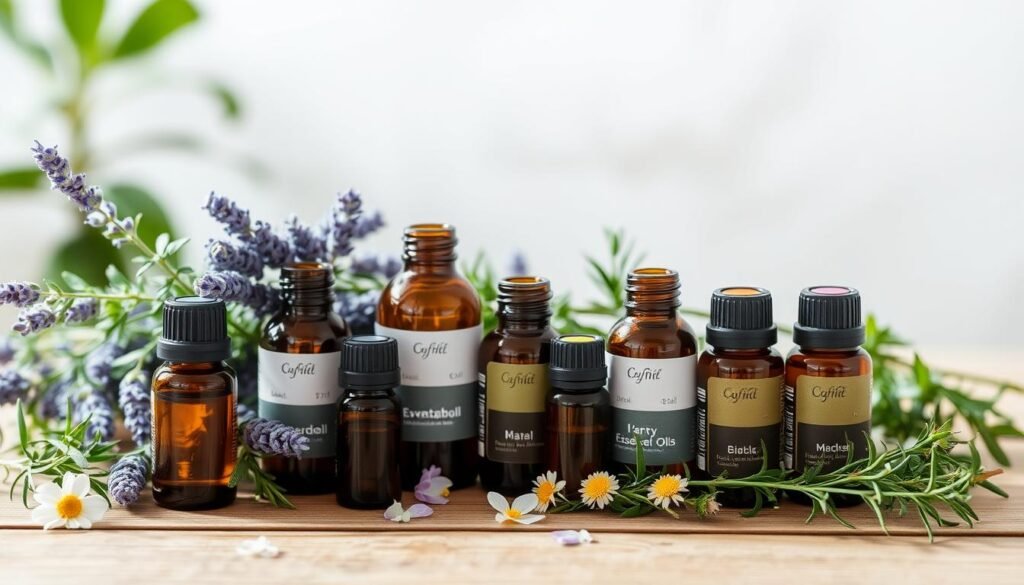Almost half of a coconut’s fats are made of lauric acid. This helps the skin soak up coconut oil well. It’s great for treating itchy scalps. An itchy scalp can be bothersome and sometimes embarrassing. Problems like dandruff, seborrheic dermatitis, and scalp psoriasis cause itchiness and discomfort.
It’s important to find treatments that really work for relief. Fortunately, there are many ways to help. These include home remedies, OTC shampoos, and essential oils. Each one can ease itchiness if chosen correctly for the problem. Knowing why your scalp itches is key to picking the right treatment. In this guide, we’ll look at five effective methods to help soothe your scalp.
Key Takeaways
- Natural oils like coconut and peppermint can soothe itchy scalp conditions.
- Dandruff shampoo helps combat common scalp irritations effectively.
- Essential oils may provide significant relief but should be used cautiously.
- Understanding scalp conditions is crucial for effective treatment selection.
- Regular treatment can prevent severe irritations and complications.
Understanding the Causes of Itchy Scalp
An itchy scalp comes from many factors, needing us to find the root causes of discomfort. Dandruff causes like seborrheic dermatitis are common. Studies show up to 25% might feel scalp itching, showing it’s a widespread issue.
Many scalp conditions can make you itch. Psoriasis, for instance, leads 58% of sufferers to report itching. In cases like lichen planopilaris, 70% feel itchy during flare-ups. Allergies, reactions to hair products, and stress are factors too.
Research tells us stress, dry air, and certain foods can make scalp itching worse. Around 36% of patients in two studies said they have sensitive scalp skin. This impacts their happiness. Diabetes, shingles, or anxiety can also worsen scalp problems.
Itchy scalp symptoms include bald spots, angry red skin, and scales. If symptoms last, getting help from a doctor is key. This is especially true if there’s hair loss or sores.
To dig deeper into itchy scalp causes, check out details on causes of itchy scalp.
Common Scalp Conditions Leading to Itchiness
Getting to know common scalp problems helps a lot in finding the right solution for itchiness. Dandruff is very common, affecting over half of people at some point. It causes the skin to flake and sometimes itch. Seborrheic dermatitis is like severe dandruff. It especially hits those with oily skin, acne, or psoriasis. Babies may get cradle cap, which is seborrheic dermatitis happening in the first months of life.
Lice infestations are very uncomfortable. Each year, over 12 million Americans, mainly kids aged 3 to 11, get lice. Ringworm, a fungal issue, is often seen in young people too. Adults sometimes deal with folliculitis, an infection from bacteria. This is more common if you shave or use hot tubs often.
Psoriasis causes too many skin cells to grow, leading to thick scales. Lichen planus shows up as purple or reddish bumps that itch. For fungal problems like ringworm, using anti-fungal cream helps a lot.
Scalp exfoliation is key for less itchiness. It gets rid of dead skin for a healthier scalp. Knowing exactly what condition you have ensures you get the correct treatment. If diet causes problems, you may need quick help. This shows how what we eat affects scalp health.
Effective Home Remedies for Itchy Scalp
Dealing with an itchy scalp can be annoying. Luckily, there are easy home remedies to help. You can find most ingredients in your kitchen or at a local store. These treatments are great for stopping itchiness before it gets worse.
Using Apple Cider Vinegar
Apple cider vinegar is known for its health benefits. Mix it with water and apply to your scalp. Doing this one or two times a week will help a lot.
Benefits of Organic Coconut Oil
Organic coconut oil is great for your scalp and hair. It moisturizes and fights off fungus. Using it regularly can make your hair healthy and stop the itch.
How Peppermint Oil Can Help
Peppermint oil feels cool and refreshing. It works well when mixed with another oil and rubbed into your scalp. Studies show it really helps with itchiness and irritation.
OTC Solutions for Itchy Scalp Treatment
Finding the right treatment for an itchy scalp often means trying different OTC options. Medicated shampoos and creams can provide relief for common scalp problems. Knowing about the active ingredients helps people find the best treatment.
Zinc Pyrithione Shampoo
Zinc pyrithione is in many anti-dandruff shampoos. It fights off fungi, helping with dandruff and seborrheic dermatitis. Brands like Head and Shoulders use this ingredient. They help make your scalp healthier with regular use.
Salicylic Acid Benefits
Salicylic acid helps by exfoliating the scalp. It’s great for conditions like scalp psoriasis and buildup issues. It also helps other topical medicines work better. Many shampoos have salicylic acid to make the scalp healthier and less itchy.
Understanding Ketoconazole Shampoo
Ketoconazole shampoo is a strong antifungal product. It’s good for stubborn itchiness from seborrheic dermatitis. It’s a recommended OTC option. Following the dosage instructions is key to getting good results.
For ongoing problems, it’s wise to talk to a doctor for the best treatment plan. For more on itchy scalp solutions, check out guides here.

Hydration and Diet’s Role in Scalp Health
For a healthy scalp, a balanced diet and hydration are key, especially when treating itchy scalp. Nutritious food builds the base for good skin and hair. The right nutrients can change scalp health by affecting moisture and comfort.
Vitamins like B3 (Niacin) help keep your scalp hydrated and hair thick. Foods such as fish, poultry, and legumes have lots of Niacin. Omega-3 and omega-6 fatty acids control moisture well, found in fish, spinach, and nuts. Zinc helps manage oil and keeps moisture in, with beans, grains, and nuts being great sources.
Not drinking enough water can make your scalp dry and itchy. Drinking plenty of water keeps your skin flexible. Eating less sugar and refined carbs can stabilize hormone levels affecting scalp health. Protein and fiber from fruits and vegetables boost your immune system, helping your skin stay strong.
Too much alcohol and caffeine can lower your hydration and affect zinc absorption, worsening scalp problems. Vitamins A, C, and iron in your diet can help your scalp’s condition. Staying away from dairy and refined sugars might also lead to better scalp health.
Eating foods full of antioxidants and essential fats helps a lot. Also, regular scalp exfoliation removes oil and dead skin, for healthier skin. Focus on staying hydrated and eating well to keep your scalp in good shape, and to lessen problems like itchiness and dryness.
Incorporating Scalp Massage Techniques
A scalp massage is great for relaxation and scalp health. It can reduce itchiness and enhance overall well-being. By stimulating blood flow, it feeds hair follicles, possibly aiding in healthy hair growth.
Several techniques make scalp massages more effective:
- Circular Motions: Use your fingertips to gently create circular motions. This boosts circulation.
- Pressure Points: Focus on pressure points at the skull base and scalp sides. It eases tension.
- Gentle Pulling: Tugging hair strands lightly during the massage enlarges blood flow to the follicles.
Adding deep breathing to your massage can improve its effects. Studies show regular scalp massages decrease neck pain from tension headaches. This points to the holistic benefits of such massages.
They also fight scalp build-up, helping those with dandruff. Starting a daily massage routine at home can foster hair growth and reduce stress. Expert massages should be done monthly for the best technique and pressure. This avoids irritation.
Head spas mix deep cleaning, exfoliation, and scalp massages. They finish with nourishing serums for full benefits.

Scalp massages offer big benefits for body and mind. They are key for treating itchy scalps effectively.
Reduction of Stress for Scalp Relief
Stress is a big factor in keeping your scalp healthy. It can cause an itchy scalp. When you’re stressed, your cortisol levels go up. This can hurt your hair follicles, making your scalp uncomfortable and more likely to have skin issues. To help with these problems, it’s good to know how to relax.
People with itchy scalps can feel better by managing their stress. This is why relaxing is so important if your scalp feels itchy.
The Importance of Meditation
Meditation helps calm anxiety and lower inflammation. It supports your overall health. By making meditation a part of your day, you can help your scalp.
Studies show it even helps with psoriasis, which causes itchy and inflamed skin. So, meditation is great for treating an itchy scalp.
Other Relaxation Techniques
There are other ways to relax that help your scalp. Yoga and guided imagery can reduce stress and make you more relaxed. These practices are good for your mind and can also help your scalp get healthier over time.
Staying active, eating well, and avoiding processed foods help too. Products like British Science Formulations Healthy Hair Serum and Design Essentials Honey Creme Moisture Retention Shampoo can also be beneficial.
| Relaxation Techniques | Benefits |
|---|---|
| Meditation | Reduces anxiety and inflammation |
| Yoga | Improves flexibility and reduces stress |
| Guided Imagery | Promotes relaxation and mental clarity |
| Deep Breathing Exercises | Enhances focus and alleviates tension |
Adding these stress management practices to your life can lessen scalp itchiness. It can also make your life better in general. Knowing how stress and scalp health are linked helps you deal with many conditions.
Essential Oils for Itchy Scalp Relief
Using essential oils is a natural way to help relieve an itchy scalp. These oils not only soothe the skin but also have healing properties that aid in relieving itchiness. Tea tree oil is especially notable for its ability to fight bacteria and reduce swelling. It tackles various scalp problems, like dandruff and irritation.
The Power of Tea Tree Oil
Tea tree oil is a top choice for dealing with itchy scalp because it fights fungal infections and lowers inflammation. It’s liked by many for easing issues such as dandruff or eczema. Research has shown that using certain essential oils can greatly lessen itchiness, proving their worth in hair care routines.
Mixing and Applying Essential Oils Safely
It’s key to use essential oils carefully to prevent bad reactions. Mixing these oils properly is a must. Use carrier oils like coconut or jojoba oil for better application and less irritation. Trying a small amount first helps you know if you’re sensitive to it. Following expert advice guarantees safe and effective use of these oils for itchy scalps.

| Essential Oil | Benefits | Recommended Carrier Oil |
|---|---|---|
| Tea Tree Oil | Antimicrobial, anti-inflammatory, effective against dandruff | Coconut Oil |
| Lavender Oil | Antifungal, soothing properties | Jojoba Oil |
| Peppermint Oil | Cooling effect, helps reduce irritation | Almond Oil |
| Rose Geranium Oil | Anti-inflammatory, alleviates itching from dry skin | Grapeseed Oil |
| Lemongrass Oil | Antimicrobial, combats dandruff | Coconut Oil |
Itchy Scalp Treatment: When to See a Doctor
Knowing when to seek help for an itchy scalp is important. Symptoms like long-lasting itchiness, sores, swelling, or big discomfort need medical advice. Conditions like seborrheic dermatitis and psoriasis often cause scalp issues. In such cases, simple anti-fungal creams or special shampoos may not work well enough.
Allergic reactions might show as red, flaky rashes, and folliculitis looks like pimples or sores. Meeting with a dermatologist is a good step. They can suggest treatments like anti-fungal creams or shampoos with selenium, sulfur, tar, zinc, or salicylic acid. These are good for seborrheic dermatitis and psoriasis.
If store-bought products don’t stop the itch or if hair loss happens, see a doctor. Dermatologists check the scalp, ask about your health history, and may suggest tests. Knowing your allergies helps a lot. It makes it easier to avoid products that irritate your skin and find the right treatment.
Sometimes, a fever with an itchy scalp means an infection that needs quick attention. Treatment depends on the cause, so professional advice is key for relief.
For more on keeping your scalp healthy and hair looking good, visit this informative resource.
Conclusion
Managing an itchy scalp means combining home fixes with doctor visits. Natural remedies like coconut oil and tea tree oil help many. But, knowing when to see a doctor is key. Conditions like seborrheic dermatitis and psoriasis are common. They can keep causing scalp problems if not treated.
It’s important to know about the different treatment options. Medicated shampoos with ingredients like zinc pyrithione and salicylic acid work well. They tackle many causes of scalp itchiness. For more on effective shampoos, check out this informative article on medicated shampoos for. Taking the right care of yourself leads to better scalp health.
Regular self-care is crucial for keeping a healthy scalp. This includes drinking enough water, eating well, and handling stress. By doing these, you can lessen the chances of having scalp issues again. This ensures a better hair care experience overall.